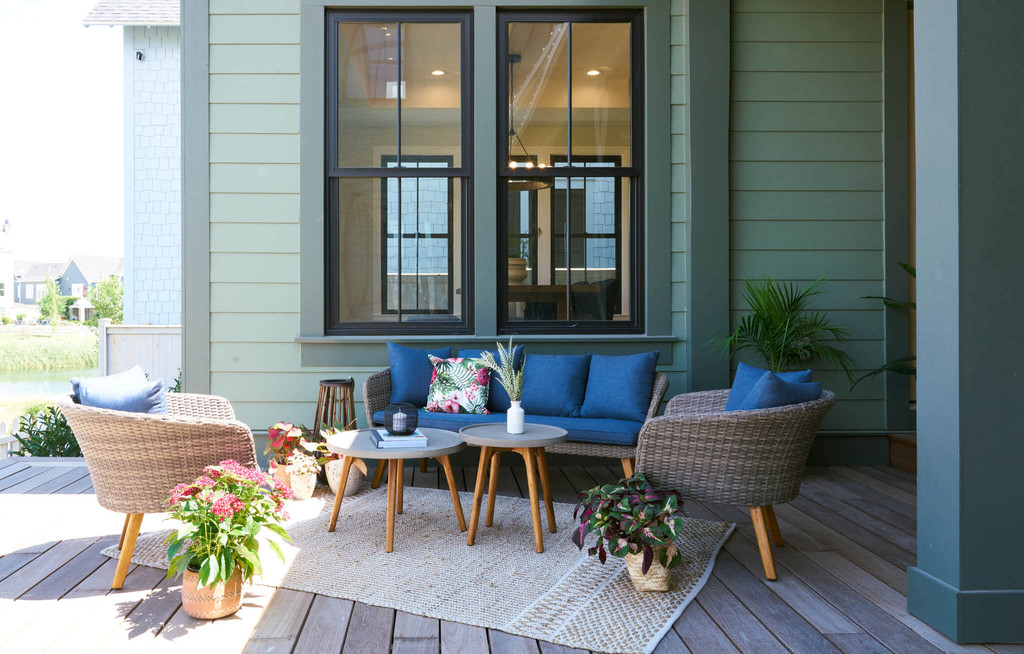It’s easy to get carried away with your dreams of home renovations. A luxury bathroom! A pool! A sunroom! And while these upgrades seem like something anyone would enjoy, many won’t do much for the resale value of your home.
In fact, some so-called upgrades can even decrease the value of your property since not everyone wants them when they’re looking for a new house. So if you’re thinking about putting in a deck or patio, it’s smart to weigh the deck or patio resale value. How much does a deck increase the value of your home? And how does that compare to a patio?
Check out our guide to learn if a deck or patio is better for resale value.
How Much Home Value Does a Deck Add?
How about adding health value to yourself with these cute Asta Seatings? #selfcare
In short: A quality deck will make a valuable addition to your house. So exactly how much does a deck increase the value of your home? Experts estimate that a deck offers a resale value of at least 76%, which is higher than any other home renovation project. So you can do the math and estimate the increased value of your home.
For example, if you can add a deck for $10,000, then on average, it will increase your home value by approximately $7,600—76% of the total. Of course, the true value varies depending on where you live. But a deck in a warm-weather climate is almost always a good idea.
The materials you use can also influence the resale value. Wood decks offer the most bang for their buck since they’re affordable and desirable in the home market. Composite decking is more expensive and doesn't provide as high of resale value, but it is higher quality than wood decking. On average, high-end decking material runs about $30 per square foot.
How Much Home Value Does a Patio Add?
Working from home? Add some Repose chairs and make sure that your comfort comes first.
Outdoor patios are usually cheaper to install than a deck, yet they tout a 100% resale value. It’s reasonable to expect that you’ll recoup your investment. Wahoo! Not many home renovations have these kinds of bragging rights.
But before you get carried away pouring concrete all over your backyard, remember that only certain patios have that much resale value. The key is to add just enough of an upgrade to your yard without going so crazy that you lose money when it’s time to sell.
Most families want a big yard with plenty of grass and other landscaping, so a small patio is usually more desirable than a large patio. Patios can be made from concrete, brick, tile, hardwood, or flagstones. But the cheapest option (concrete) is best for maximizing resale value, coming in at an impressive $5 per square foot. Outdoor lighting and pergolas can also offer a good resale value and enhance the space while you live in the home.
Does a Covered Patio Add Value?
A covered patio offers shade and privacy in your backyard. It makes a great place to grill in the summer and get some fresh air in the winter—even in stormy weather. But the ultimate question remains: Does a covered patio add value to your home?
The answer is yes! Adding a covered patio definitely adds value to your home. However, as with any upgrade, it’s important to remember that the most high-end, extravagant upgrades probably won’t increase the value significantly more than middle-range upgrades. To recoup the cost of your investment, stick with mid-level materials and finishes.
However, you can design your dream-covered patio even if you're concerned about resale value. You’ll still have years ahead of you to enjoy it, and if money is not an object, then the benefits certainly outweigh the drawbacks.
Is It Easier to Build a Deck or Patio?
At this point, you know that a patio offers a slightly better resale value than a deck. But since both patios and decks add significant value to your home, it’s usually best to go with whatever option appeals to you the most. And when you’re making that decision, you may want to consider the following: Is it easier to build a deck or a patio?
Usually, a patio is much easier to install than a deck. Essentially, you pour the concrete, let it dry, and voila! It’s ready to go. However, patios do require some extensive preparation before you get to work. The area must be flat and compacted, and the concrete must be poured on the ground. Many concrete patios call for rebar to reinforce the structure, so this is another element to consider before getting started.
In contrast, a deck can be installed on flat or sloped ground, but it does require a support system that professionals best build. The deck should be secured to the ground with deep cement holes. Decks also require waterproofing materials to ensure the foundation of the house isn’t damaged with the installation of the deck.
How Big Can a Deck Be Without a Permit?
Another consideration when building a deck is whether or not you’ll need a permit. A permit is required if your deck will be attached to the house or is 30 inches above grade. However, a few types of decks don’t require a permit. A permit isn’t necessary for freestanding less than 30 inches above grade or smaller than 200 square feet. A deck can be 199 square feet before requiring a permit.
Of course, these rules may differ depending on where you live, so check with your city building codes to ensure you’re following local regulations.
If you build a deck that requires a permit, you’ll need to apply for a permit by filling out a form and including the details of your deck plans. This includes details like height, stairs and width, spacing of joists, materials used, and more.
Will Adding a Deck Increase My Taxes?
Adding a patio or deck will probably increase the resale value of your property—so does it increase your taxes, too? It depends.
Cities have varying laws regarding taxes, so you’ll want to consult your local authorities to find out for sure. In general, adding a deck will slightly increase your taxes since it boosts your property’s value. In fact, almost any changes to the structure of the home will increase taxes, including the installation of a pool or gazebo.
This doesn’t need to be a deal-breaker since the tax increase may not outweigh the resale value added. Ultimately, if you think you’ll enjoy your deck and get a lot of use out of it over the years, it is probably worth the investment. Make sure to do your research so you know what to expect when it comes to local tax increases.
Does a Deck or Patio Add More Value?
Milea Collection proudly uses puppy-approved Sunbrella® Pet-Friendly fabric.
Both a deck and a patio offer an impressive resale value. However, patios are usually less expensive, and their resale value is 100%—slightly higher than a deck's 76% resale value. Can’t argue with that! Concrete patio resale value is the show's real star, offering the lowest price point to install and the highest returns.
But the numbers will show you that if you’re doing this solely as a financial investment, the best you can reasonably hope for is to break even on the cost of completing the project.
If you’ve got a few years left in your current home, we recommend going for whichever addition most excites you. Go for the option you want to spend time in. Whether you recoup your entire financial investment, those hours will be worth it.





